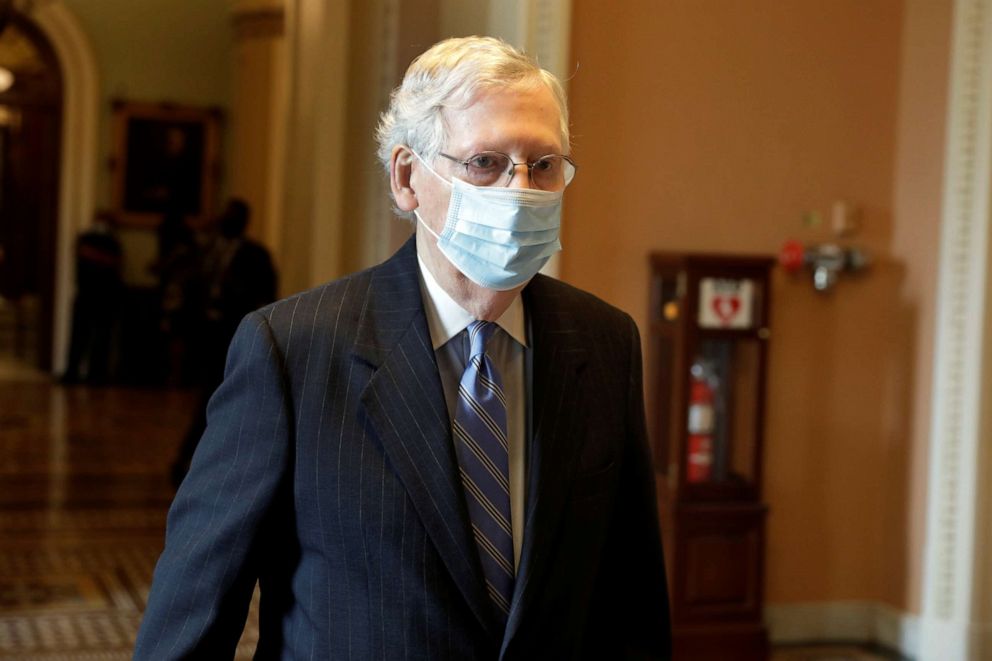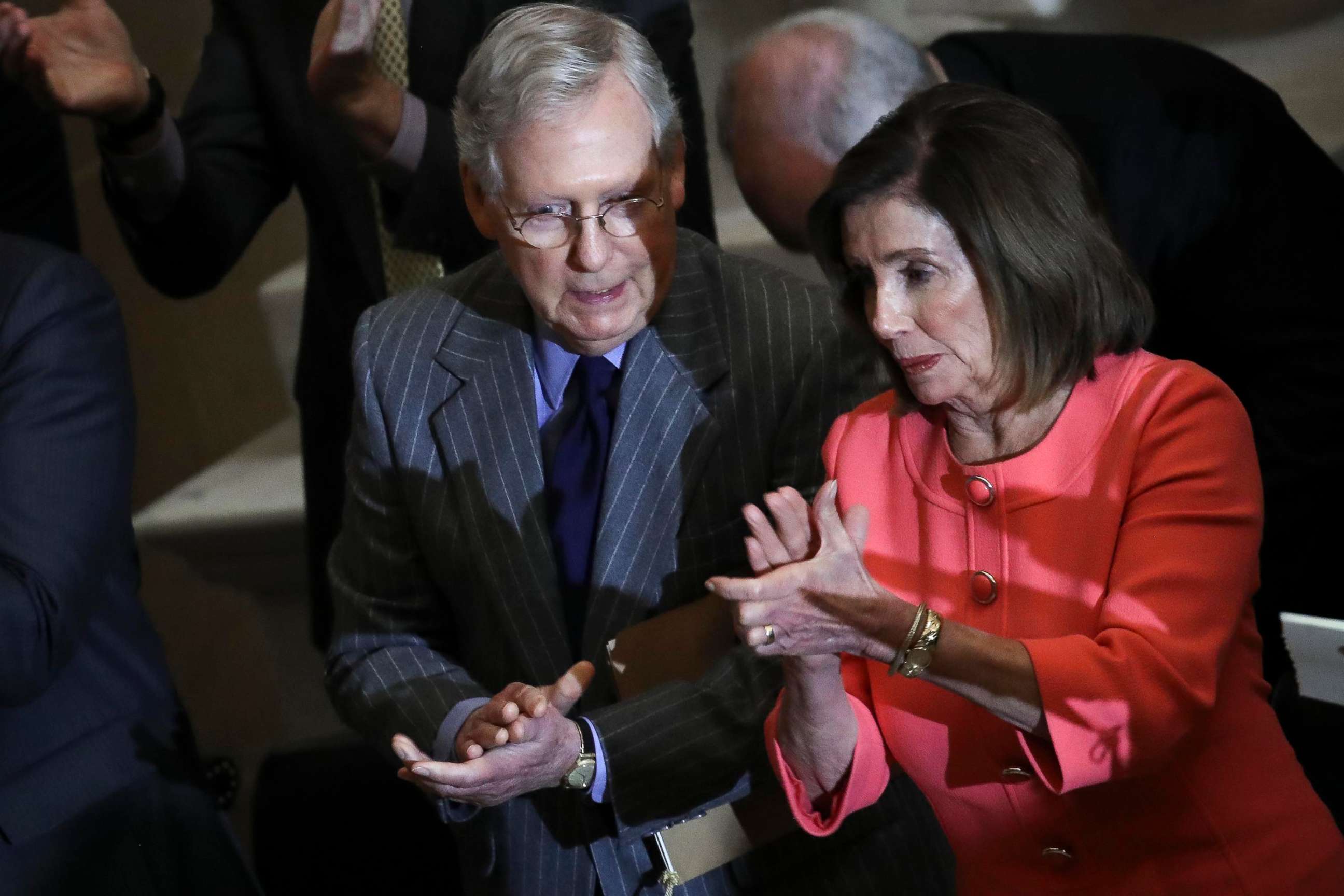3 months in, commission overseeing $500 billion of taxpayer dollars remains leaderless
Members from both sides of the aisle urge Pelosi and McConnell to pick a chair.
Though Congress came together to pass a $2.2 trillion stimulus package in March, three months later Democrat and Republican Party leadership still remain divided on one decision that's keeping a key oversight commission from moving forward: who will lead it.
So far, four members have been appointed to the Congressional Oversight Commission, which was created to monitor $500 billion of loans the Federal Reserve will dole out to different corners of the economy to bridge the damage from coronavirus. The commission has produced two public reports so far on the program; one per month since the commission was created. For there to be a fifth member and chair of the commission, though, requires a bipartisan feat: joint agreement from both Speaker of the House Nancy Pelosi and Senate Majority Leader Mitch McConnell.
Two Republicans, Sen. Pat Toomey of Pennsylvania and Rep. French Hill of Arkansas, along with two Democrats, Bharat Ramamurti, a former economic adviser to Sen. Elizabeth Warren, D-Mass., and Rep. Donna Shalala of Florida, were appointed to the commission by congressional leaders back in April.
But the lack of a chair nearly three months later has stymied integral functions like hiring staff, conducting thorough investigations and, perhaps most importantly, holding public hearings with officials from the Federal Reserve and Treasury Department, members of the commission said in interviews.
Ramamurti, the only non-congressional member on the commission, said on Twitter Thursday that the 83-day delay in naming a chair -- and therefore preventing the commission from hiring staff -- was creating "serious obstacles to performing robust oversight."
The commission will rely on its staff to help monitor the impact of the Fed's programs on different markets through research and in-depth analysis, Ramamurti explained in an interview. "And that takes expertise and that takes time, and we don't have that, because we don't have staff, because we don't have a chair," he said.
The chair of the commission would also be a tie-breaker for important decisions, providing a fifth vote, and likely be the heavyweight in compelling officials to testify, as the commission lacks subpoena power.
"I'm absolutely 100% sure that since [the beginning] they've attempted to work on this, both surface names, interview people and talk to people on the telephone, take advice. And I just think, in my view, neither one of them has told me this, that they have had trouble finding somebody they both liked, and that would say yes," Hill, one of the Republican members of the commission, told ABC News in a phone interview.
Pelosi and McConnell appeared close to a decision last Thursday, when Pelosi told reporters on Capitol Hill an announcement was "imminent." Asked about the delay, an aide to a member of the oversight commission said the agreed upon candidate was being vetted for potential conflicts of interest.
A Pelosi spokesman declined to comment on the nomination, referring ABC News to her comments last week. McConnell's office did not respond to a request for comment.
"They are near a decision, is my understanding," said Hill, who was selected for the commission by House Minority Leader Kevin McCarthy and was a senior official in the Treasury Department in President George H.W. Bush's administration.

Because of the fragile negotiations, members on the commission briefed on the discussions between McConnell and Pelosi are keeping a tight lid on names of the contenders, fearful a premature announcement could scuttle the vetting process and cause candidates to withdraw from consideration for the role, which the CARES Act stipulates will last through 2025.
Nonetheless, commission members from both sides of the aisle have urged their party leaders to move quickly.
"I'm in favor of having a chair as soon as it is possible," Toomey, Hill's fellow GOP member on the commission, said in a phone interview.
"It just makes more sense to have the chair before we're doing hearings, for instance, or before we hire an executive director and really begin staffing up," he said.
Hill, too, noted the benefit of hiring staff, which the commission can't do without a chair. The oversight body would be "more effective and more efficient if we had a modest commission staff to assist in the process," he said.
Damon Silvers served on the watchdog committee chaired by then-law professor Elizabeth Warren that oversaw bailout funds during the 2008 recession, after which the current commission is modeled. In his testimony before a congressional caucus last week he explained the integral role of the panel's chair.
"The absence of the chair for the current oversight commission is a crippling deficiency," Silvers warned during a hearing before the Congressional Progressive Caucus.
"Having excellent and numerous staff is essential. And the willingness to create expectations around regular reports and hearings and to make demands for data and witnesses is essential," Silvers said.

But some commission members noted that the urgency is different than it was in 2008 because, at this stage, less taxpayer money has been distributed.
"Very little of this money has actually gone out the door," said Toomey.
The Fed has only made use of $6.7 billion from the nearly $500 billion available, according to the commission's June report, and for the time being, only two of the four lending facilities set up by the Fed are up and running.
"So I don't think there's been some kind of institutional failure here on the part of the commission. We are functioning and there is very little oversight to actually be done with respect to actual transactions," Toomey said.
Ramamurti, however, noted more he'd like to do in the meantime.
"Just the announcement of what they plan to do is having a big impact that would be useful to study," Ramamurti said. "The fact that they haven't acted sooner also has implications that are worth studying."
The commission is scheduled to hold its first sit-down meeting with the Treasury Secretary Steven Mnuchin and Federal Reserve Chair Jerome Powell on Wednesday, giving Pelosi and McConnell another potential deadline to announce the commission's leader.
ABC News' Benjamin Siegel contributed to this report.




